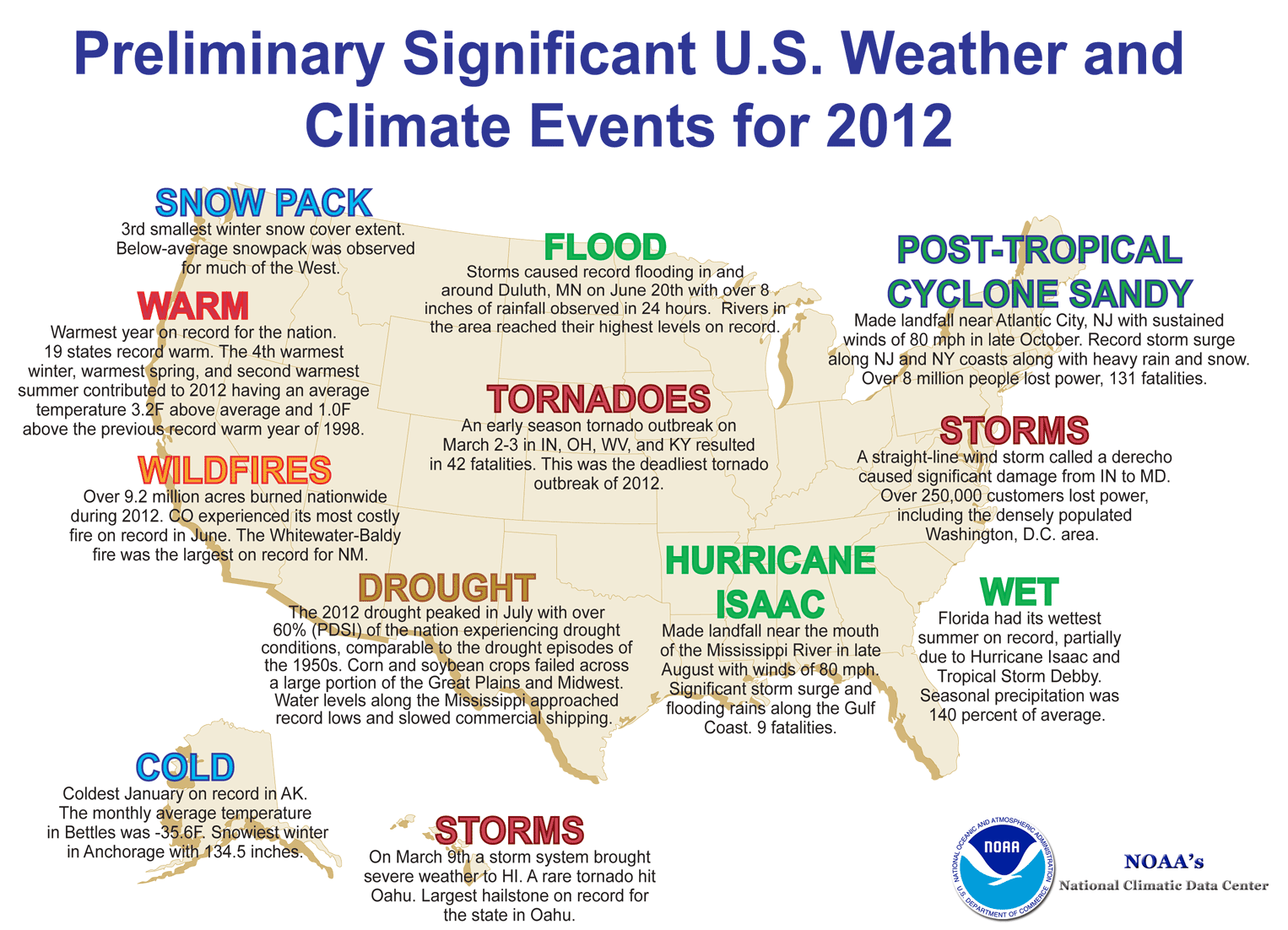
There are extremes and then there are EXTREMES.
Last year seemed to bring one weather-related disaster after another, including the following:
- In June an intense linear storm known as a derecho spawned extreme thunderstorms across the eastern United States.
- In late June record-breaking heat met or exceeded more than 1,900 previous daily high temperature records.
- Throughout the year dry, hot conditions in the West aggravated wildfires, which burned large swaths of New Mexico, Colorado and Oregon, to name but a few of the most affected states, and set records for average fire size.
- By September, the high temperatures helped expand the moderate to extreme drought that had plagued the nation all year to cover some 60 percent of the lower 48 states, a mark it remained near through the end of 2012. (See chart.)
- At the end of October Superstorm Sandy whipped up the East Coast inundating the mid-Atlantic states with rain and snow and devastating New Jersey and New York with record high storm surge and flooding. (See Sandy weather details here.)
But Now It's a New Year, Clean Slate, Break From the Past, Right?
Unfortunately it doesn't look like it. As a for instance, check out this article from today's New York Times. Australia, Brazil, Britain, China, the Middle East and Russia are all in the throes of highly unusual and in many cases record-breaking events.
In Australia (see dramatic satellite images and photos) and Brazil it's drought and heat; in Russia and China it's cold; in Britain, floods and the Middle East, a snowstorm. Here in the United States, of course, much of the nation remains in the grips of a debilitating drought, and loads of folks in the Northeast are still struggling to dig out from under the destruction wrought by Superstorm Sandy. (More on Sandy recovery here and here.)
What's going on? Because we're talking about the weather, we can't answer that one with 100 percent certainty -- after all, we often can't even say with 100 percent certainty whether or not it will rain tomorrow. But scientists are more and more in a position to conclude that there's a high probability that global warming has had a significant role in many of these kinds of events. (See here, here and here.)
And it’s not just scientists. A recent poll (pdf) by The Associated Press found that the spate of extreme weather events is converting a fair number of former climate skeptics who are more inclined, apparently, to extrapolate from their own personal experience than to trust climate scientists. The same appears to be true for folks in general, a recent study by Peter Howe of Yale University and colleagues published in the journal Nature Climate Change suggests: those who experience extreme weather are more likely to accept climate change.
Now Here's Something Really Extreme
Global warming's influence on extreme weather is one thing, but what about its effect on volcanoes? The idea that volcanic activity could be driven by climate change seems a bit far-fetched, right? No, says Steffen Kutterolf of GEOMAR Helmholtz Centre for Ocean Research Kiel and colleagues.
Writing in the journal Geology, the authors report on the result of a study using ocean sediment cores to locate specific layers of volcanic rock in the seabed. Inferring from the depth of those layers when they occurred, they then correlated those dates with dated deposits found on land. Looking over the last million years, they found evidence of major volcanic events during times when the earth was transitioning from periods of glaciation.
Why? Using modeling, they speculate that the rapid melting of glaciers on the continents during these transition periods causes "the weight on the continents to decrease," changing the stress on the underlying tectonic plates and allowing magma (molten lava inside the earth) to move to the surface and erupt. (Read more on the study.)
So does that mean we also need to worry about volcanoes as well as extreme weather in our warming world? Well, folks near active volcanoes probably always need to worry about eruptions, but probably not global-warming-induced ones.
The most recent period of intense deglaciation occurred shortly after the Last Glacial Maximum, which ended about 20,000 years ago. So even though the authors found that volcanic activity followed periods of rapid deglaciation by about 4,000 years, those events are too long ago to be a cause of concern today.
Sure, there's a lot to worry about these days, but one thing you can cross off your worry list is whether driving your car could cause a volcanic eruption. Of course a little volcano action in some out-of-the-way, unpopulated location might not be all that bad -- it'd cool things down a bit for a few years. But only for a few years, not nearly long enough to avoid more extreme weather from greenhouse gas emissions. And so that remains kinda worrisome.
Crossposted with TheGreenGrok | Follow us on Facebook
